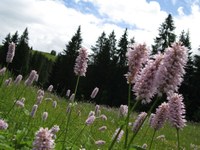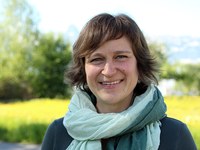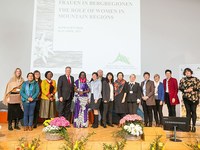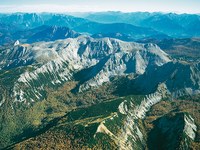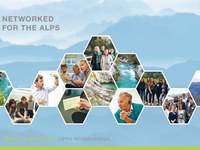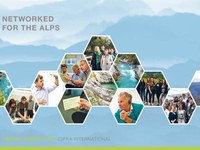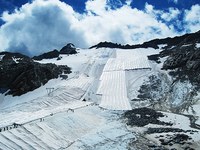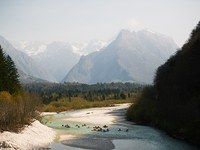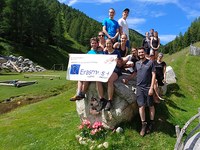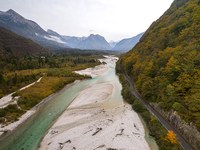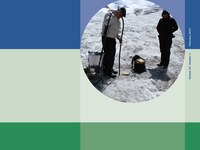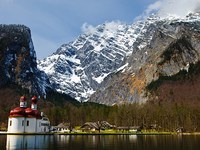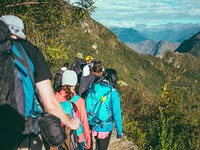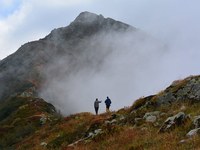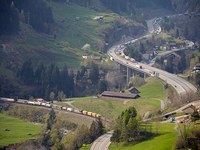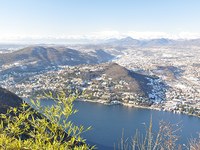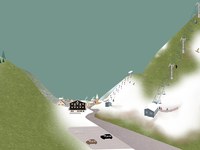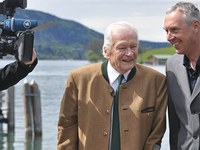Search
2784 items matching your search terms.
speciAlps
[Project completed] Grasslands, marshes, hedges, biotopes and woods are examples of natural treasures and biological diversity that are of great value to alpine regions and municipalities. Not only do they offer a habitat for plants and animals, but also humans value functioning natural areas for their attractiveness and the quality of life they offer. Nevertheless, –these areas have much more potential than we often realise and there is much more every municipality can do!
CIPRA Project
International
Soil quality, Nature
Point of view: Biodiversity Conservation: less talk, more action
May 22nd marks the International Day for Biological Diversity, an initiative brought into life by the Convention on Biological Diversity in 2000. Martha Dunbar, Project Manager for Biodiversity and Landscape, fears that now in 2017 we are still treading water.
News
Nature
Alpine Convention puts equality on the agenda
With a women’s conference and a declaration, the Austrian presidency has placed a new topic on the agenda of the Alpine Convention – and raised expectations. But where do things go from here?
News
International
Alpine Politics, People
No ski-lift connection permitted in nature reserve
The Federal State of Upper Austria gave its legal opinion on the expansion of the “Höss-Wurzeralm” ski area in April. The matter is now on file.
News
Austria
Alpine Politics, Tourism & Leisure
Publication
International
Alpine Politics, People
Transit traffic: a partial success on the Gotthard Pass
The Gotthard Pass has seen a historic low in transalpine goods traffic since the adoption of the law governing the modal shift. In contrast, the number of trucks crossing the Brenner Pass continues to increase.
News
International, Austria, Italy, Germany, Switzerland
Mobility & Transport
Point of view: A "man's world" and "women's work": time to move on
Equal opportunities are still a women’s topic . Yet there are sufficient reasons to treat it as an issue for society as a whole. Everyone benefits – especially in the Alps, believes Barbara Wülser, deputy director of CIPRA International.
News
International
People
Networked for the Alps
CIPRA is a small organisation that can boast a large network. Its annual report shows how this permits people to tackle the challenges facing the Alps together.
News
International
Alpine Politics
Polluted glaciers
Pesticides, herbicides, medicines – all these materials were found at over 2,700 metres above sea level. The water flowing down from the Presena glacier into the valley reflects this state of affairs.
News
International, Italy
Climate
Paddling for the “blue heart” of Europe
The end of March saw the start of the Balkan Rivers Tour in Slovenia, the largest water protection action in Europe. The aim is to protect its last unspoilt rivers.
News
International
Nature
whatsalps youth
[Project completed] Many young people spend most of their time indoors, sit in front of the TV or the computer. The "whatsalp youth"-project lured them out. The CIPRA Youth Council, together with CIPRA International and other project partners, was implementing it.
CIPRA Project
International
Nature, People
International Day of Action for Rivers
Fishing, farming, swimming, canoeing, hiking, drinking…. All in all, we are thousands of people benefiting from the resources provided by alpine rivers. However, only healthy rivers can provide these so-called ecosystem services. Alpine river ecosystems are vulnerable and often under pressure from various human activities. Can we do more to protect them? Yes!
News
International
Water
Mountain Research and Development, Vol 37, No 1: Special Issue
This issue offers 14 peer-reviewed articles focusing on questions related to water, risk reduction, energy, land use change, biodiversity, vegetation ecology, conservation, gender policy, ethnobotany, indigenous knowledge, economic opportunities, mobility, and glacier monitoring—always with sustainable development in mind. Geographically, papers present insights from Nepal, China, Thailand, Kyrgyzstan, Poland, Switzerland, Italy, Ecuador, and Colombia.
Publication
Economic activity in mountain areas
What can – and cannot – mountain areas do? Two new studies from Germany and Switzerland show the opportunities and weaknesses of regional economies and demonstrate that mountain areas can help in determining their own economic future.
News
Germany, Switzerland
Economy, Tourism & Leisure
The wandering classroom
Young people spend the majority of their school time indoors. The new “whatsalp youth” project moves the classroom into the mountains and learning into the great outdoors.
News
International
Nature, People
Worthwild
[Project completed] Only minimally impacted by human intervention, areas with limited infrastructural development in the Alps provide European societies with a wide range of ecosystem services, such as the conservation of biodiversity and climate regulation.
CIPRA Project
International
Nature, Spatial development, People
GaYA
[Project completed] Governance and youth in the Alps - Young people tend to leave the Alpine space because they lack personal and professional fulfilment. Furthermore a majority of decision-makers remain unaware of the benefits a young active population brings to society.
CIPRA Project
International
People
AlpInnoCT
[Project completed] The Alps are a sensitive ecosystem that has to be protected from pollutant emissions and climate change. The alpine road freight transport has enormous ecological and sociocultural effects on the alpine habitat. Most actors such as forwarders, port operators, administrations and consumers, are aware of these negative effects and they are working on their own technical or regulatory solutions. However, a constructive and participatory dialogue between all involved actors, in order to promote sustainable freight transport within the Alps, has not been established so far.
CIPRA Project
International
Economy, Mobility & Transport
Solstice in winter tourism
Tourism has brought wealth to the Alps. In many regions it remains an important source of income, but lack of economic diversification is also a risk. The importance and orientation of tourism differs strongly among Alpine countries, but all of them need new strategies and approaches to cope with shifts in visitor behaviour and climate change. A socio-economic transformation is needed that takes account of tourism’s past, present and future potential.
Position
International
Alpine Politics, Economy, Nature, Tourism & Leisure
Sad, but true
Tignes, located in the French Alps, is responding to the retreat of glaciers, and thus of the available ski pistes, with a very special project of its own:
News
France
Tourism & Leisure
Open Alps 2017
The end of 2016 saw the announcement of the winners of the 2017 “Open Alps” human rights award. This honour is given to individuals or groups who actively work for the rights of refugees, immigrants, socially disadvantaged persons and threatened minorities in Europe.
News
International, Austria, Italy, Switzerland
People
Foundations laid for Triglav National Park
It has taken 16 years, but the management plan for Slovenia’s only national park is now ready. The participatory process has ensured that it is broad-based in nature.
News
Slovenia
Nature
Winter tourism – a destination shaping change
What are the challenges facing winter tourism in these times of climate change and new patterns of visitor behaviour? CIPRA takes a fictional resort and presents the possible decisions and their consequences: the interactive presentation is accompanied by a web dossier and a position paper.
News
International
Tourism & Leisure
Urban regions show the way forward
The “Alpine Town of the Year” association is celebrating its 20th anniversary. A brief summary of the facts shows that throughout the past years Alpine cities have been pioneers of sustainable development in the Alps.
News
Slovenia
CIPRA mourns Wolfgang Burhenne
The nature conservationist and environmental campaigner Wolfgang Burhenne, whose activities took him all round the world, died on 6 January 2017. The 93-year old was a co-founder and the first secretary-general of CIPRA.
News
Mountain Research and Development, Vol 36, No 4: Mountains of Our Future Earth
Papers emerged from the 2015 Perth III mountain conference and contribute to Future Earth. The first 3 present a tool to compare mountain photos, gender-sensitive participatory agroforestry, and social impact assessment; others explore seedling regeneration, ecosystem services, visitors’ use of energy, in-migration dynamics, environmental impacts of migration, and farmers’ decision-making. The last 3 are review-based agendas for future mountain research
